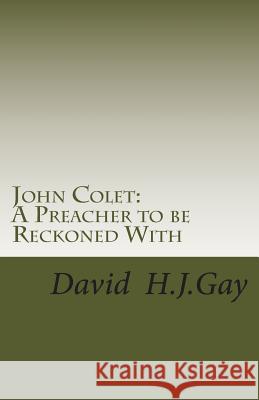John Colet: A Preacher to be Reckoned With » książka
John Colet: A Preacher to be Reckoned With
ISBN-13: 9781484968338 / Angielski / Miękka / 2013 / 36 str.
It is the late fifteenth century. The medieval Roman Church, collapsing under the weight of its own corruption, has, thus far, resisted calls from within for serious reformation, and resisted with barbaric cruelty. John Wycliffe has been dead for a hundred years, his bones having been burned in 1427, and Lollardy has been crushed (yet not exterminated - 'heresy' simmers just beneath the surface). But Rome has more to contend with than internal pressures for reform. Christendom is besieged by an enemy from the east and south. The consequences of the papal schism have so weakened the papacy that the decadent Church is impotent in the face of the persistent and growing threat of Islam. So much so, Christendom has been banished to the north-western extremity of the known world, the Church long since having been driven out of Africa by the warring hordes of Mohammed, his followers then moving on into Spain - where, for seven hundred years, they have kept their hold. Constantinople fell to the Saracen in 1453. Venice and Rome are threatened. And Christendom has suffered all this, despite the treasure in blood and gold which it has lavished on the Crusades. In the late fifteenth century, Islam can boast five times - five times - as many adherents as Christianity. Christianity is doomed. Or so it must have seemed. But... But God... God does not need mortals - but he usually chooses to work through men and women to accomplish his purposes. So it was in the late fifteenth century. One of the men God used at that time is the man I want to speak to you about - John Colet.
Zawartość książki może nie spełniać oczekiwań – reklamacje nie obejmują treści, która mogła nie być redakcyjnie ani merytorycznie opracowana.











